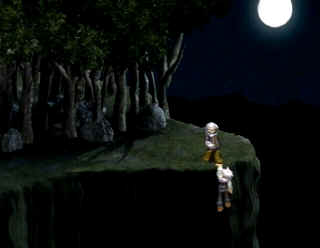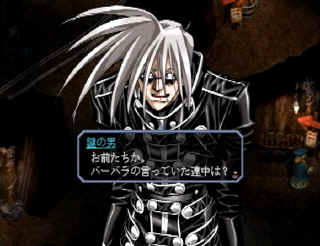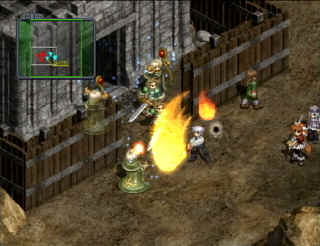Growlanser III: The Dual Darkness is like a
striptease act in which the stripper starts off attractive and interesting but grows
steadily revolting and boring as the clothing is shed and the same dance moves are used
over and over.
 Growlanser III is closely
connected to the two previous games and renders a pre-history backdrop for the future
events of Growlanser I and II. This prequel shares many of the
same traits as its immediate predecessor, with which it is bundled in the US release.
Unfortunately, the changes made are often for the worse.
Growlanser III is closely
connected to the two previous games and renders a pre-history backdrop for the future
events of Growlanser I and II. This prequel shares many of the
same traits as its immediate predecessor, with which it is bundled in the US release.
Unfortunately, the changes made are often for the worse.
The main character, Slayn, suffers from both amnesia and silent hero syndrome. Therefore,
he wanders around confusedly not saying much. Of course, his past is teasingly revealed,
but the astute gamer can easily deduce the storyline direction from the first quarter of
the game. However tried-and-true, this storyline is the strongest point of Growlanser
III, and it is enjoyable to see it played out through well thought-out character
interactions.
The story does not have major branches, but players can influence Slayn's character by
choosing conversational responses. Each response adds/subtracts to Slayn's invisible
characteristic marks and ultimately will limit the methods of response; eg, it is not
unusual to have five different conversation options in a given dialogue, but Slayn is only
able to actually use three of them due to his previous responses. While a nice attempt at
customization and showing the importance of consistent characterization, ultimately it
becomes somewhat tripe to see conversation options that cannot be selected.
 Veterans of Growlanser II will
immediately appreciate the same basic battle system of free-moving strategy. Rings, gems,
magic, and techniques all serve in their former capacity, which is nice since the game
featured an excellent SRPG battle-style.
Veterans of Growlanser II will
immediately appreciate the same basic battle system of free-moving strategy. Rings, gems,
magic, and techniques all serve in their former capacity, which is nice since the game
featured an excellent SRPG battle-style.
Growlanser III does make a few notable changes though. First, characters now have
the option of using healing items in battle, which almost eliminates the need for healing
spells since items are used much more quickly and are cheaply available. In conjunction,
characters also no longer recover hit points between battles, making long-term strategy
more important.
Second, the number of playable characters has been halved to four. While this does
simplify battles by reducing the number of characters to keep track of, it also diminishes
the joyful complexity of battle seen in previous entry. Third, characters can now cast
magic outside of battle, in effect allowing players to beef up all party members with
stat-boosting spells just prior to battle.
Fourth, characters can now perform cooperation magic - combining spells to form a more
powerful spell. Oddly, these spells could be performed by a single character in Growlanser
II. This further reduces the overall options for any given situation as any major
spell requires half of the total characters and eats mana points wholesale.
 New included features include an
explorable overworld map and random dungeons. The former is a nice addition; the latter is
a heaping pile of dragon dung. Of special note during the overworld exploration are random
battles in which there is an objective - to save an innocent creature, snatch a chest from
monsters, or protect a merchant train. Each of these feature different outcomes depending
on success or failure.
New included features include an
explorable overworld map and random dungeons. The former is a nice addition; the latter is
a heaping pile of dragon dung. Of special note during the overworld exploration are random
battles in which there is an objective - to save an innocent creature, snatch a chest from
monsters, or protect a merchant train. Each of these feature different outcomes depending
on success or failure.
Dungeons consist of square rooms on a square grid, the simplest being 3x3 and ranging up
to 6x6 with battles activated randomly by entering a new room. Exciting this is not.
Though the auto-battle feature will save much frustration, a better design would have made
dungeon exploration something more than a chore.
In overall difficulty, Growlanser III is about the same as the previous, but it
is far easier to exploit. Spend a few hours in the arena, fighting the right battles, and
the characters will easily become godlike and thus able to steamroll through the latter
half of the game. Even without powerleveling, the difficulty is easy and few battles will
end in defeat.
Visually, it's adequate, but not stunning. Anime-style characters are abundantly evident,
but these characters are slightly bishonen and may not appeal to all gamers. Battle
visuals are sprite based, but well rendered. The soundtrack is decent and serves its
purpose well. Many of the same voice actors return from Growlanser II and provide
mixed performances; some characterizations are spot-on, but others are depressingly
terrible.
As an added bonus to those who completed II, some characters from that game may
be imported to be playable in Growlanser III. The downside to this is that it
occurs so late in the game that the added characters are mostly a novelty. If character
numbers had been maintained at eight playable, then this might have led to some
interesting strategic options, but since there are only four slots available at any given
time, it would require a significant time investment to utilize the majority of the
characters from the previous game.
Growlanser III does feature multiple endings, but they are simply variations on a
single theme. Side quests are practically nonexistent, and the replayability factor is
negligible. Fans of Growlanser II are sure to want to play through to experience
the storyline, but ultimately Growlanser II is a better game and since the two
are packaged together, it is highly recommended to play Growlanser II first.